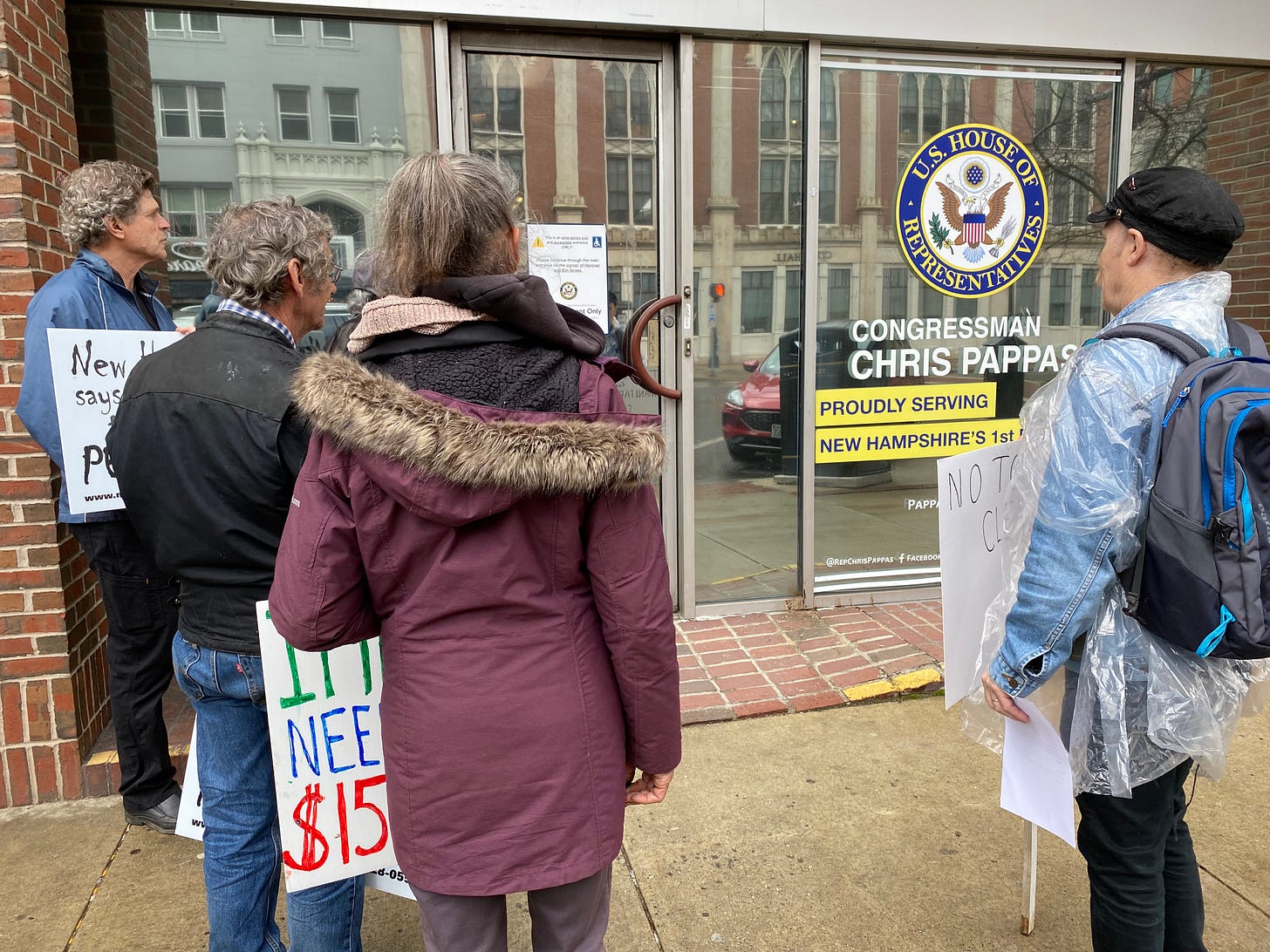The Betrayal of Silence: Why Activists are Angry at Rep. Chris Pappas
At recent public events, Palestinian rights defenders have targeted their anger at Rep. Chris Pappas (D, NH-1). At the huge “Hands Off” rally in Concord, Pappas was booed off the stage by people opposed to his support for Israel’s war on Gaza. For so long, the Palestinian people and their supporters have been told to wait: to wait for justice, to wait for empathy, to wait for the world to notice their pain. For in the world of politics, where words are not just words but weapons, silence is not neutral. Silence is an accomplice. And silence, in this case, has spoken louder than any words of support.
Pappas has become the face of this betrayal; a betrayal not of ignorance, but of indifference. His failure to unequivocally condemn Israel’s actions in Gaza and his reluctance to take a firm stand in favor of Palestinian human rights is nothing short of an abandonment. But this is not an isolated incident; it is part of a wider pattern of political capitulation that has allowed the suffering of Palestinians to be framed not as a question of justice, but as a political inconvenience.
Let us be clear: this is not just a matter of geopolitics. This is about life and death. The words we speak, the policies we endorse, and the positions we refuse to take all have consequences for human lives. So when Chris Pappas speaks of a “balanced approach” to the Israeli-Palestinian conflict, the anger of Palestinian activists cannot simply be dismissed as the hot-headedness of radicals. It is a visceral reaction to the grotesque normalization of violence; a violence that has been allowed to fester under the cover of political convenience and diplomatic cowardice.
Pappas’s inaction speaks to a deeper sickness in the American political establishment. It is the kind of sickness that perpetuates the false equivalence between the oppressor and the oppressed, between the colonizer and the colonized. There is no balance to be struck here, no symmetry in the scales of justice. There is no moral ambiguity in the face of an occupation that has lasted for decades, in the face of the displacement of millions, in the face of a people who have been denied the basic right to live in dignity and freedom. The refusal to name the oppressor, to call the occupation by its rightful name, is a capitulation to the status quo that has caused untold suffering.
But perhaps what stings the most is not Pappas’s refusal to speak out, but his willingness to speak up only in defense of the very forces that have perpetuated this injustice. His statements on Israel’s right to defend itself are not just morally bankrupt, they are complicit. They signal that for Pappas, Palestinian lives are expendable, their cries for justice inconvenient. This is the kind of politics that Palestinian activists have grown accustomed to: the politics of silence, of avoidance, of rhetoric that serves the powerful and silences the weak.
There is a palpable sense of betrayal that comes from those who are supposed to stand in solidarity with the oppressed, but who instead cling to the safety of the status quo. For Palestinian activists, the silence of Chris Pappas is not just an absence of support; it is a betrayal of the very principles he claims to uphold. It is the betrayal of every Palestinian child who has grown up under the shadow of war, of every mother who has buried her son, of every father who has watched his family be torn apart by bombs and bullets.
But this silence also feeds something more dangerous: the illusion that the world’s indifference is somehow justifiable, that there is no need for urgency, no need for a radical shift in the way we understand justice. This indifference allows Israel to continue its siege on Gaza, its settlement expansion, its attempts to erase Palestinian culture, identity, and history. It is the same indifference that allows the U.S. to continue its uncritical support for Israel, no matter the cost to human lives.
For the activists and ordinary Palestinians whose lives have been upended by a never-ending cycle of violence, Pappas’s refusal to act is not just a disappointment; it is a reminder that even in the halls of power, justice is not guaranteed. It is a reminder that the fight for Palestinian rights is not a political issue to be compromised on, but a moral issue that demands clarity and courage.
It is time for Chris Pappas to understand that silence, when it comes to the lives of the oppressed, is a betrayal of humanity. And the anger of supporters of Palestinian solidarity activists, far from being an irrational outburst, is the righteous fury of those who have been ignored for far too long. It is the sound of a people who will no longer accept being silenced. They demand not just words, but action. They demand not just diplomacy, but justice.
And if Pappas refuses to listen, it is his own political career that will be defined by that silence, not the cause of justice. Because in the end, history will remember those who spoke for the oppressed, not those who clung to their silence in the face of suffering.




